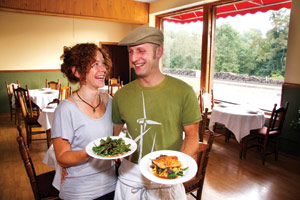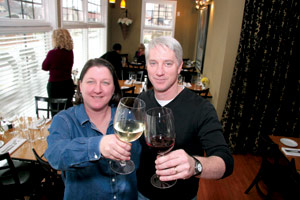If there's anything small-business advisors find as scary as undercapitalization, it's choosing the wrong partner.
"Partners present the opportunity for turmoil," counsel the authors of Small Business for Dummies (Wiley, 2008) before outlining nightmare partnership scenarios in which entrepreneurs found themselves friendless, broke and in court.

While business schools types generally agree that partnerships outperform one-man shows, the potential pitfalls are so enormous that readers of business advice books could be forgiven for assuming partnering is an arrangement best left to masochists and Marxists.
But business owners persist in taking on partners, whether it's because they want to share the risk, problem solve in tandem or — as is the case in a startling number of Asheville restaurants — because they love their partner very, very much.
It's not uncommon for couples to get into the restaurant biz, which offers opportunities for a diverse array of skill sets ("You cook? Hey, I love people!"). What's special about Asheville's couple-run restaurant scene is that it encompasses some of the area's most exciting eateries. Last year's three best new restaurants, as selected by Xpress in its year-end wrap up, are all married-couple enterprises (Sugar Beet Café, Chai Pani and Knife & Fork). So are a number of restaurants that consistently top local must-eat lists: Tomato Jam Café, Fig, French Broad Chocolate Lounge, 12 Bones Smokehouse and Early Girl Eatery.
Strikingly, these restaurants aren't just giving lip service to the joint ownership concept; while any restaurant venture invariably infringes upon even an officially uninvolved spouse's time and patience, owners of these establishments are very much equal partners. Patrons of the places named here are extraordinarily likely to encounter both spouses on any given visit, which hints at how often these hard-working lovebirds are together.
For less stable couples, that constant closeness can devolve into bickering, nitpicking and general nastiness — which can sink a business and a marriage. Yet experts like Becky Stewart-Gross say entrepreneurial projects can actually enhance already strong marriages, a sentiment echoed by Asheville's restaurant couples.
"In a healthy marriage, a husband and wife can really complement each other," says Stewart-Gross, a business coach who's written about couples in business. "Now you bring that into a restaurant, and you can create the joy of team effort."
Stewart-Gross adds that the cooperative relationship between two spouses often filters down to staff members, a phenomenon that Fig Bistro owners Treavis and Traci Taylor have worked to cultivate. The Taylors opened the catering company that evolved into Fig in 2000, four years after they were married.

"One thing we've always done here is pool tips, which creates a sense of teamwork," Treavis Taylor says. "We try to lead by example."
The Taylors have very different professional backgrounds: Treavis Taylor was working as an engineer when he spotted his betrothed-to-be waiting tables at Barley's. He has a minutely focused analytical mind, while she's an artist who tends to gravitate to big ideas. That's the sort of mixed-up personality profile business advisors love, but Taylor says it underscores the need for clear conversations.
"We spend a lot of time together in the morning, having coffee," Taylor says. "We sit down and hash out issues. I think the best thing is we do it first thing in the morning, when we're fresh. We're fresh, even if we don't agree."
Glenn Muske, a business professor at Oklahoma State University, has studied hundreds of "co-preneurs," couples in which both spouses are recognized as decision makers. He's found no evidence that businesses run by married couples are any more or less successful than businesses run by best friends, cousins, a lone entrepreneur or any other conceivable ownership strategy, but suggests communication is critical for a married couple trying to make its business work. For obvious reasons, the mistake of calling one's business partner an ignorant moron takes on even more damaging dimensions when the partners share the same bed at night.
"A lot of communication has to take place here," Muske says.
Stewart-Gross and Muske say it's fine for spouses to disagree about business matters, but their discussions should be imbued with a trust and respect rooted in shared values. If the husband likes red tablecloths, while the wife fancies orange, that's not partnership-ending material. But if one spouse works 100 hours a week while the other spouse prioritizes gym workouts and movie going, their business relationship's chances are dim.
"What felt natural for us is there's a way in which fundamentally, we're very similar," says Mollie Irani, who owns Chai Pani with her husband Meherwan. "In goals and ethics, we're on the same page."
The Iranis have been married for 15 years, and Irani attributes their business success partly to their well-honed relationship.
"He's learned I need to communicate, and I've learned he needs to go into a cave and be with his thoughts," she laughs.
The word that comes up most often in speaking to business advisors and owners about co-preneurs is "boundaries." Most everyone agrees that married couples should strive to keep their work life and home life as separate as possible, since nobody wants a general manager storming into a kitchen and screaming that the chef didn't replace the toothpaste. Within the business too, Stewart-Gross adds, it's important that both spouses have "clear job responsibilities and expectations."
Rebecca Daun-Widner, who co-owns Tomato Jam Café with her life partner Charlie Widner, admits it's sometimes hard to leave job duties at work.
"Here, Charlie is the chef with a capital 'c'," she explains. "It's very easy to fall into those assumptions at home."
Still, Daun-Widner says, the pair has managed to make their partnership work by resorting to what she calls "general life advice."
"It's just knowing what you can control, figuring out what you can roll with and having a sense of humor," she says.
Irani says she's come to very same conclusion: "A lot of it comes down to having a sense of humor," she says. "We try not to sweat the small stuff too much. We love what we're doing and we love each other."
Or, as Taylor puts it, "I've never partnered with anyone else, and we don't want to partner with anyone but ourselves."


Before you comment
The comments section is here to provide a platform for civil dialogue on the issues we face together as a local community. Xpress is committed to offering this platform for all voices, but when the tone of the discussion gets nasty or strays off topic, we believe many people choose not to participate. Xpress editors are determined to moderate comments to ensure a constructive interchange is maintained. All comments judged not to be in keeping with the spirit of civil discourse will be removed and repeat violators will be banned. See here for our terms of service. Thank you for being part of this effort to promote respectful discussion.